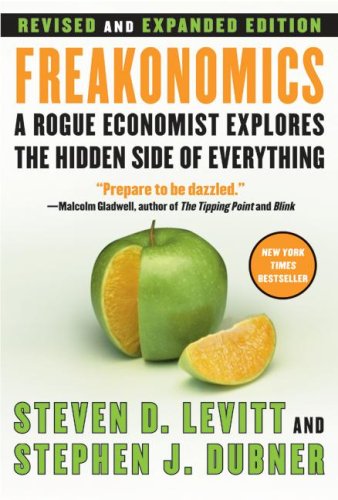All Nonfiction
- Bullying
- Books
- Academic
- Author Interviews
- Celebrity interviews
- College Articles
- College Essays
- Educator of the Year
- Heroes
- Interviews
- Memoir
- Personal Experience
- Sports
- Travel & Culture
All Opinions
- Bullying
- Current Events / Politics
- Discrimination
- Drugs / Alcohol / Smoking
- Entertainment / Celebrities
- Environment
- Love / Relationships
- Movies / Music / TV
- Pop Culture / Trends
- School / College
- Social Issues / Civics
- Spirituality / Religion
- Sports / Hobbies
All Hot Topics
- Bullying
- Community Service
- Environment
- Health
- Letters to the Editor
- Pride & Prejudice
- What Matters
- Back
Summer Guide
- Program Links
- Program Reviews
- Back
College Guide
- College Links
- College Reviews
- College Essays
- College Articles
- Back
Freakonomics: A Rogue Economist Explores the Hidden Side of Everything by Steven D. Levitt and Steph
Freakonomics promises to “literally redefine the way we view the modern world,” but it’s just a compilation of completely random and unreliable statistics and shoddy conclusions. Here are my four biggest problems with Freakonomics:
1. So what?
Levitt offers plenty of interesting anecdotes, but in the end, you’re left wondering, “So what?” So what if sumo wrestlers cheat, if the KKK was kind of childish, if drug dealers are poor? What do these facts have to do with ANYTHING?
Really, this should be a trivia book, not an economics book. Much of it isn’t related to economics at all.
2. Freakonomics: A Rogue Economist Explores the Not-So-Hidden Side of His Narcissism
Every chapter begins with a quote, some lengthier than others, about Levitt’s unparalleled genius and charm. Here’s one: “‘Levitt is considered a demigod.’” Or how about: “He is the guy who, in the slapstick scenario, sees all the engineers futzing with a broken machine—and then realizes that no one has thought to plug it in.”
Perhaps all these quotes are added because Levitt needs them to make his arguments seem more valid. Otherwise, he’d be just another self-proclaimed intellectual.
The amazing thing is that all the quotes come from the same article in The New York Times Magazine. It’s pretty hilarious that Levitt couldn’t find any other source that worshiped him.
And why exactly was the writer of this particular article such a sycophant? Perhaps it’s because the writer is Stephen J. Dubner, the co-author of Freakonomics.
3. Levitt is so self-absorbed that he doesn’t realize he’s not making sense
On the decline of the crime rate in the 1990s: “But Fox and the other purveyors of conventional wisdom were wrong. The bloodbath did not materialize. The crime rate in fact began to fall—so unexpectedly and dramatically and thoroughly that now, from the distance of several years, it is almost hard to recall the crushing grip of that crime wave.”
After this, Levitt goes on to discuss his revolutionary idea that no one ever thought of: it was Roe v. Wade that lowered the crime rate. Here the weakness of Levitt’s argument is made apparent. His supposed prowess lies in the fact that he saw what “experts” could not, but he is coming up with an explanation after the fact. He is comparing himself to experts of the 1990s, over whom he has the huge advantage of years of insight.
4. Levitt unwittingly insults and contradicts himself (this gave me quite a few laughs)
When you give your chapters titles like “How is the Ku Klux Klan like a group of real-estate agents?”, it’s probably not a good idea to say later in the book that “Just because a question has never been asked does not make it good."
Levitt sure likes to put down others: “It may be sad but not surprising to learn that experts like Snyder can be self-interested to the point of deceit. But they cannot deceive on their own. Journalists need experts as badly as experts need journalists. Every day there are newspaper pages and television newscasts to be filled, and an expert who can deliver a jarring piece of wisdom is always welcome.” To a careful reader, it’s quite clear that Levitt and Dubner fit this description perfectly. One’s an expert, one’s a journalist; together they’ve created a monster, I mean, bestseller.
Similar Articles
JOIN THE DISCUSSION
This article has 0 comments.

